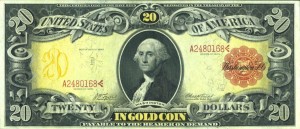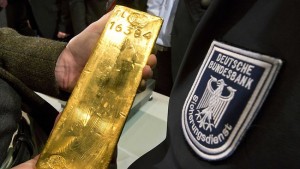Jim Clifton of Gallup, CEO of one of the largest public polling companies in the world, has published a severe indictment of the official unemployment data reported by the United States Department of Labor. Obama and Wall Street cite the 5.6% unemployment rate as a triumph of the American economic recovery, while conveniently ignoring the raw data behind that number.
There’s no other way to say this. The official unemployment rate, which cruelly overlooks the suffering of the long-term and often permanently unemployed as well as the depressingly underemployed, amounts to a Big Lie.”

In his latest commentary from Euro Pacific Capital, Peter Schiff delves into the repercussions of the political and economic drama playing out in Greece. Peter explains why the newly elected Greek government feels it holds a position of power as a debtor nation in today’s upside down economic climate. Peter also draws similarities between the smug bravado of the new Greek finance minister and President Obama’s latest budget and monetary policy. What will happen when it becomes clear to the world that the United States cannot repay its debts?

The London Gold Fix is a nearly 100-year-old price-setting system for the international price of gold. Beginning in March, one or more Chinese banks may be included in the pool of fix participants for the first time ever.

Last month, the Federal Reserve Bank of St. Louis published an essay that supposedly debunks the idea that a monetary gold standard can stabilize and improve economies. The piece is blatant propaganda that returns to the same excuse central bankers always use to discredit the gold standard. Namely, that tying a currency to gold prevents a government and its central bank from quickly responding to economic problems by manipulating the money supply. This is the same argument used to defeat the “Save Our Swiss Gold” campaign back in November, which would have forced the Swiss National Bank to significantly increase its gold reserves.

Peter Schiff explains the sharply lower GDP growth in the fourth quarter of 2014 and shares his predictions for 2015. Peter asks the ultimate question that everybody seems to be ignoring – How can analysts expect the United States to experience better GDP growth in 2015 when they also expect the Federal Reserve to raise interest rates and refrain from further stimulus? It’s the Fed’s monetary policies that stimulated this phony recovery in the first place.
German Central Bank Continues Gold Repatriation
Bundesbank – Germany’s central bank, the Bundesbank, increased its transfer of foreign gold reserves back into Germany in 2014, bringing 120 metric tons to Frankfurt. 85 of those tons came from the New York Federal Reserve. This repatriation process began in January 2013, when the Bundesbank announced a plan to store half of its gold reserves at home by 2020. To achieve this goal, Germany will have to repatriate 300 tons from New York and 374 tons from Paris. It has now transferred 23% of that total 674 tons.
Read Full Article>>

Tom Woods interviewed Peter Schiff this week. Woods is a senior fellow at the Mises Institute, a New York Times bestselling author, and a well-respected voice of Austrian Economics. He and Peter had a friendly conversation about the broader economic problems facing the world and what investors can do to prepare.
 Last fall, SchiffGold Precious Metals Specialist Dickson Buchanan attended the Gold Standard Institute’s conference in New York City. In this article, Dickson explains the philosophy of Keith Weiner, founder of the Gold Standard Institute (GSI). Like Peter Schiff, Weiner is deeply concerned about the destruction of the US dollar by the Federal Reserve’s monetary policies and believes we need to return to using gold as money. Any views expressed here do not necessarily reflect the views of Peter Schiff or SchiffGold.
Last fall, SchiffGold Precious Metals Specialist Dickson Buchanan attended the Gold Standard Institute’s conference in New York City. In this article, Dickson explains the philosophy of Keith Weiner, founder of the Gold Standard Institute (GSI). Like Peter Schiff, Weiner is deeply concerned about the destruction of the US dollar by the Federal Reserve’s monetary policies and believes we need to return to using gold as money. Any views expressed here do not necessarily reflect the views of Peter Schiff or SchiffGold.
“The greatest problem facing the world today is monetary,” began The Gold Standard Institute’s founder Keith Weiner in his opening remarks at the New York City conference. Having successfully made the transition from technology entrepreneur to world-class monetary economist, Keith walked us through his business plan for the Gold Standard Institute (GSI). An advocate of what he calls the “unadulterated gold standard,” Keith gave a detailed presentation of the reasons why the gold standard is not only superior to the present fiat system but is also urgently necessary for today. Throughout his talk, several thought-provoking issues were raised that differentiated GSI from other sound money advocates.
The Chinese yuan became one of the top five payment currencies in the world in November, according to the latest data from SWIFT, one of the largest international interbank transaction companies. The yuan jumped from seventh to fifth place, overtaking the Australian and Canadian dollars. With the yuan accounting for 2.17% of global payments, it is not far behind the Japanese yen, which has a 2.69% share.

As Wim Raymaekers, Head of Banking Markets at SWIFT, puts it:
The RMB breaking into the top five world payments currencies is an important milestone. It is a great testimony to the internationalisation of the RMB and confirms its transition from an ’emerging’ to a ‘business as usual’ payment currency. The rise of various offshore RMB clearing centers around the world, including eight new agreements signed with the People’s Bank of China in 2014, was an important driver fueling this growth.”
Canadian television network BNN spoke with Peter Schiff about the US economy and the potential for gold in Canadian dollars in 2015.



